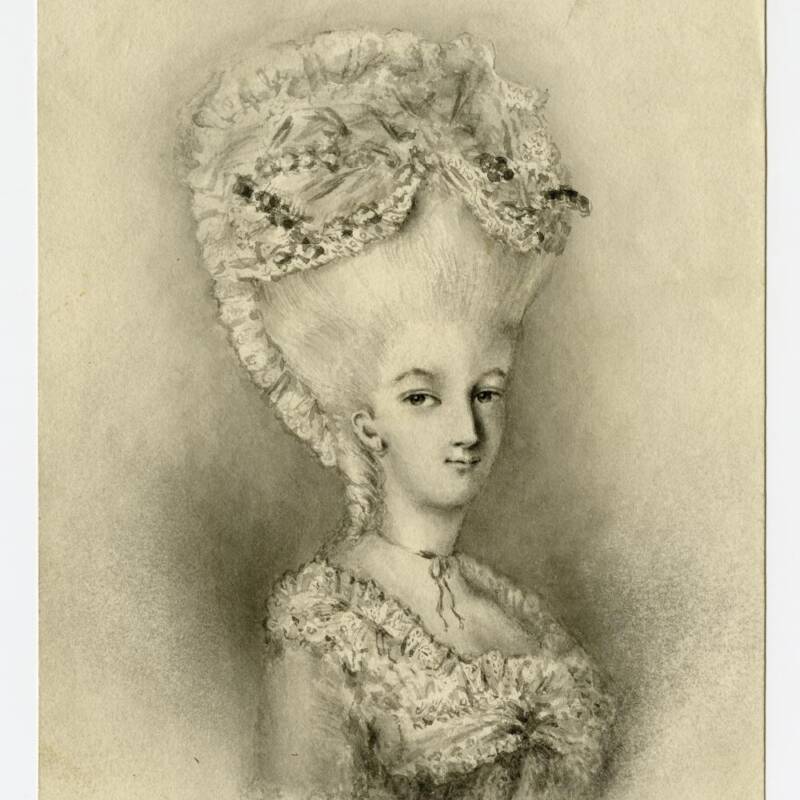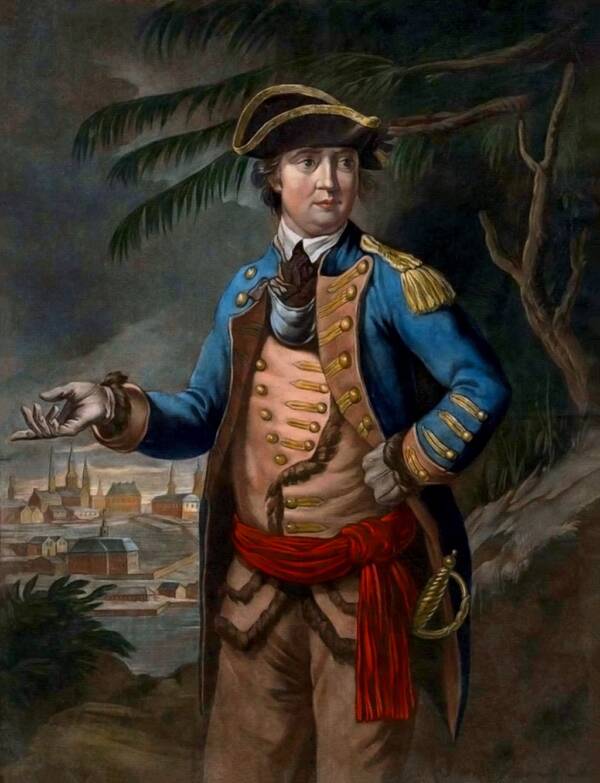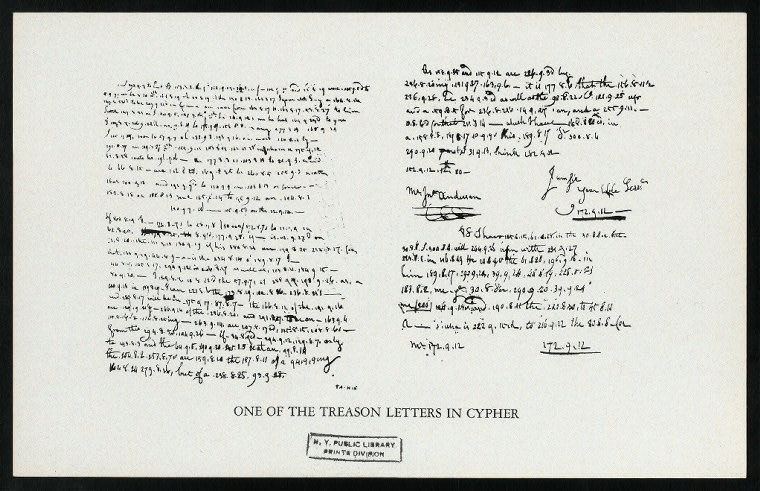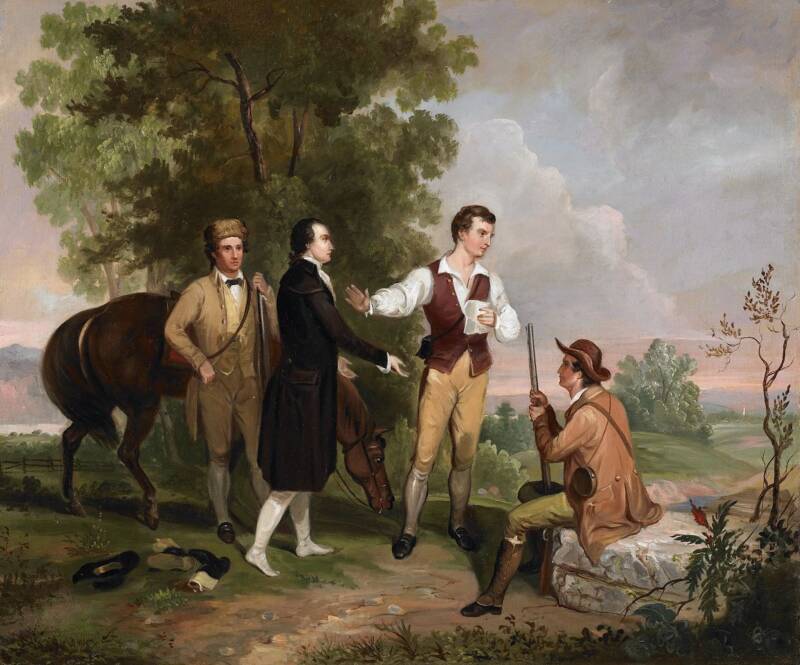The wife of American traitor Benedict Arnold, Peggy Shippen played a crucial role in her husband’s espionage ring during the Revolutionary War.

John André/Historical Society of PennsylvaniaA sketch of Peggy Shippen drawn by British officer John Andre.
At 15 years old, Peggy Shippen dined with the likes of George Washington, as well as British General Thomas Gage. Little did the teenager know at the time that she would play a central role in the coming revolution — and become part of one of the most legendary acts of treason in American history.
Just two years later, the British occupied Philadelphia, where the Shippen family lived. And at 18, Peggy married none other than Benedict Arnold – and helped him betray the cause of liberty.
Peggy Shippen, The Belle Of Philadelphia
The looming clash between Britain and the colonies consumed Peggy Shippen’s childhood. At age 5, when the British passed the Stamp Act, young Peggy heard her father lament, “Poor America! It has seen its best days.”
Trained on her investor father’s knee, she absorbed Edward Shippen’s political views. Shippen did not support the independence movement, though he kept that opinion largely private.
The Shippens were well connected. Early in the war, Peggy Shippen’s brother Neddy ran off to join the British army. When the Continental Army captured him, George Washington personally sent him home.
Then the British occupied Philadelphia. Shippen became a permanent fixture at the wartime balls where, one British officer recalled, “We were all in love with her.”
John André, another British officer, romanced Shippen. He sketched her likeness and wrote poetry about the young beauty.
Before the British withdrew from Philadelphia in 1778, Shippen attended a lavish celebration wearing a Turkish harem costume designed by André. After the costly festival, a Quaker diarist complained, “How insensitive do these people appear while our land is so greatly desolated.”
The British swept out and the Americans swept in. Benedict Arnold, an American hero recovering from two gunshot wounds to his left leg, became the military governor of Philadelphia.
Within weeks, Peggy Shippen and Benedict Arnold were a couple. And by fall, he asked her father for permission to get married. The Shippens at first resisted: How would it look if their family openly aligned with an American officer?
But in the spring of 1779, Shippen married Benedict Arnold. A month later, the couple set a plan into motion that would make them infamous.
Becoming Mrs. Benedict Arnold
Peggy Shippen was 18 when she married Benedict Arnold. But did she still love John André? Mere months passed between André leaving Philadelphia and Arnold declaring his love for her.
In fact, the British officer left Shippen with a memento: a locket with a piece of his hair. Even parted, the pair wrote to each other across the battlelines.
Those letters became the key avenue for Benedict Arnold to communicate with the British – all with the help of Shippen.

Thomas Hart/Brown UniversityBenedict Arnold became a Revolutionary War hero before sending military secrets to the British and switching sides.
As military governor of Philadelphia, Arnold faced allegations of profiteering. According to the whispers, Arnold let Loyalists transact business if they gave him a cut. As the rumors grew louder, Arnold turned to General George Washington for support. But Washington stayed silent – even when the state brought charges against Arnold.
“If Your Excellency thinks me criminal,” Arnold wrote to Washington in May 1779, “for heaven’s sake let me be immediately tried and, if found guilty, executed.”
Feeling burned by the general, Arnold turned to his wife. And Peggy Shippen showed Arnold how to contact the British.
With Shippen’s help, Arnold began writing to the British in invisible ink. She taught her husband the cipher she used. The code used the page number, column number, and line from Bailey’s Dictionary to write any word in an almost unbreakable cipher.

New York Public LibraryA coded letter with the handwriting of Benedict Arnold and Peggy Shippen shows her central role in her husband’s negotiations with the British.
Shippen sat down to encode Arnold’s words, handed off the message to one of her contacts, and, 20 days later, decoded the response from the British. The courier and Arnold almost never met. Instead, she managed the process, knowing the letters would end up in John André’s hand.
In the coded messages, Shippen negotiated with André for her husband to provide plans of West Point. She sealed the deal with the following message: “Mrs. Arnold presents her best respects to Captain André, is much obliged to him for his very polite and friendly offer of being serviceable to her.”
For over a year, Peggy Shippen and Benedict Arnold sold American secrets to the British. One tip-off told the British when to attack Washington’s base. Another let the British know they could seize Charleston with little resistance.
The Traitorous Peggy Shippen
In the summer of 1779, Peggy Shippen met with her contact to negotiate her husband switching sides. The Arnolds would need a minimum of £10,000 to formally join the British side and turn against the Americans.
By the spring of 1880, Benedict Arnold had offers on both sides. The British promised to name Arnold a general – and make him £20,000 richer – if he handed over West Point. General Washington promised to name Arnold his second in command.
Arnold weighed the offers and decided to betray his country.
Shippen arrived at West Point with dreams of a noble title. If Arnold could hand over the strategic fort and potentially capture George Washington in the process, a grateful King George would certainly offer him a dukedom.
On Sept. 21, 1780, Arnold planned to meet John André and turn over West Point. That is, until the Americans captured André — with evidence of the plot in Arnold’s handwriting.

Asher Brown Durand/Birmingham Museum of ArtThe capture of John Andre in September 1780 revealed Benedict Arnold’s plot with the British.
The plot exposed, Benedict Arnold fled across British lines before Washington could capture him. He left behind Shippen with an infant baby. After burning every incriminating paper she could find, she pretended to know nothing about her husband’s treachery.
Upon witnessing Shippen’s hysterics, Alexander Hamilton declared, “I wished myself her brother, to have a right to become her defender.”
Her performance convinced General Washington himself. He helped Shippen rejoin her traitorous husband in New York. At the same time, the Americans executed John André.
After the war, the Arnolds moved to England, where Queen Charlotte personally gave Shippen a pension of £1,000 per year. She raised five children, and her four sons all became British officers while her daughter married a British general.
Peggy Shippen only visited the United States once after the war and faced such hostility that she quickly returned to England. Shippen outlived her husband by three years, dying in 1804 at the age of 44. She kept the lock of John André’s hair until her death.
Ironically, Peggy Shippen’s gender protected her for centuries. Many wrote off the witty young wife of Benedict Arnold, assuming she could not possibly have aided her husband’s treason.
Yet documents from the British headquarters only discovered in the 20th century revealed the truth: Peggy Shippen played a central role in Benedict Arnold’s betrayal.
Peggy Shippen wasn’t the only spy in the American Revolution. Next, read about the mysterious Agent 355 who spied for George Washington and the heroic undercover spying of James Armistead Lafayette.





